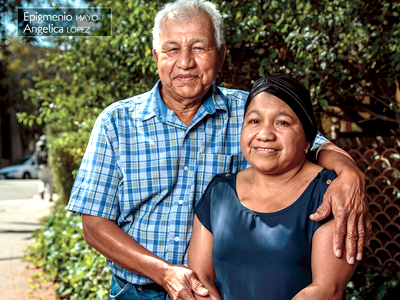
In 2016, an estimated 1,685,210 new cases of cancer will be diagnosed in the United States and 595,690 people will die from the disease. Approximately 39 percent of men and women will be diagnosed with cancer at some point during their lifetimes.
Claudia Ruiz, 50, of Alameda was diagnosed with breast cancer in February, 2014. In February of this year, a CT scan showed no evidence of disease and Ruiz is very grateful for all of the treatment and support she received through a journey that was both frightening and enlightening.Ruiz is especially grateful for the support she received from Women's Cancer Resource Center (WCRC) in Oakland, which offers free services to all women with any cancer. WCRC helps women with cancer improve their quality of life through education, supportive services, and practical assistance.
“I was feeling very vulnerable and afraid,” says Ruiz of when she was first diagnosed and started treatment.
Ruiz was receiving radiation treatment at Sutter Health in Oakland when a nurse asked if she’d like to speak with a social worker.
“The social worker told me about WCRC and encouraged me to contact them to meet with a therapist for twelve sessions.”
Ruiz met with a counselor at WCRC and they discussed Ruiz’s concerns and fears about her health, future, and her career and ability to earn an income. The therapist also told Ruiz about the Tamalpa Institute, where Ruiz later attended sessions of dance and expressive arts therapy.
WCRC is celebrating thirty years of ‘community, compassion and change’ this year.
Teiahsha Bankhead is Director of Development at WCRC. Cancer impacted her family five years ago when her mother was diagnosed with stage 4 breast cancer. Today, mom is doing well.
“It’s rare that services are so integrated – cancer brings people together,” says Bankhead of the programs and support provided by WCRC staff and volunteers.
The need for WCRC’s services is clear, especially for the Hispanic community -- forty percent of the cancer patients that WCRC serves are Latina -34 percent speak only Spanish.
“Black and Latino women have more late stage diagnoses and higher mortality,” adds Bankhead.
WCRC has a special program focus for Latinas that provides cancer care navigation, emotional support, and education in Spanish and English.
“It’s a very important place for cancer patients to find community, to find resources and the tools to learn,” says Ruiz of WCRC, which offers a diverse set of programs and services.
WCRC’s support groups are run by licensed therapists or trained facilitators, and each facilitator has experience specific to the group they facilitate. Groups focus on alternative care, expressive arts (art therapy) and other areas.
WCRC also offers psychotherapy sessions free of charge for low-income and uninsured women and couples.
Emergency financial assistance is also available to low income people living in Alameda and Contra Costa counties
WCRC also manages an information and referral helpline with volunteers and staff who conduct intakes, develop care plans, recommend resources, answer questions, and provide emotional support and follow-up.
“When I called WCRC, I felt supported,” says Nona Montoya of Oakland. “I felt that this organization was not just about people working there but that they have the soul to do the work, the spirit to want to help people.”
Many of WCRC’s services are provided by volunteers, who play an essential role by providing information, resources, and emotional and practical support to women at risk for and diagnosed with cancer.
Marking its 30th year in the community, WCRC recently held a fundraising event in Oakland to raise funds for a building that will become their new office and resource center. The new center is a sign of WCRC’s growing role in the community – it also represents the community’s growing support for women with cancer.
“Open up to ask and receive support, to ask for resources,” says Ruiz to anyone who is living with cancer and may not have much support. “To go through it by your self would be more difficult than anything else.”

